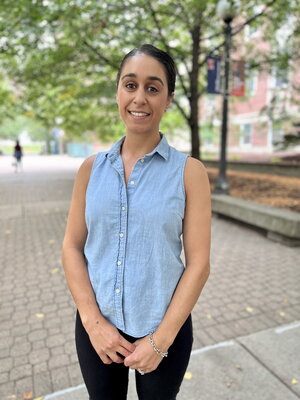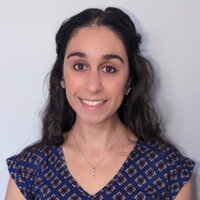When Illinois chemistry Prof. Anastasia Manesis started graduate school at The Ohio State University, her plan was to pursue biomedically relevant research. Then she met Prof. Hannah Shafaat, who became her PhD advisor and her whole plan “was sort of blown to pieces.”
“She totally inspired me to pursue biologically relevant energy conversion reactions. I'm very thankful for it because, looking back, it just wouldn't have been the right decision for me to go in the other direction,” said Manesis, who is also very thankful for the mentorship she received from Shafaat. “I've had amazing women mentors. Hannah is the first person who really believed in me that I could do what we'll call ‘hard science.’”
Reflecting on what Women’s History Month means to her, Manesis said it’s a time for all to remember that we are standing on the shoulders of giants.
“There are a lot of people who came before me that really paved the way to allow me to even be in this position doing what I'm doing,” Manesis said.
After doctoral work under Shafaat, Manesis said she had the good fortune to work with more amazing and outstanding female scientists, including her postdoctoral research advisor, Dr. Amy Rosenzweig at Northwestern University.
“She supported my development professionally but more importantly, my growth as a person. I just know that there's no way I would be in this position now without both my PhD and postdoc advisor supporting me in the way that they did,” said Manesis, who joined the Illinois chemistry faculty in 2023 and is building her physical lab space and her research group that, so far, has four graduate students and three undergraduates, who are paired with grad students to build mentor-mentee relationships.
“When it comes to Women’s History Month, I really feel that I've benefited from the actions of the people before me. Looking forward, it's my responsibility to pass that on and make sure that I'm mentoring the next generation, and I'm providing that support system,” Manesis said.
It is exciting, she said, to grow her team and have discussions with them about their ideas and what their data means and work together to build projects from the ground up.
“That is the thing I am the most excited about. Working with them every day has been really fun,” she said. “We’re really hitting the ground running, getting all of our equipment hooked up, and really starting to sink our teeth into research.”
Their focus, Manesis explained, will be in the realm of bio-inorganic chemistry.
“We are interested in looking at protein systems, but more specifically, protein systems that have metals in them—so metalloproteins and metalloenzymes. We’re pulling in our inorganic expertise, in terms of reaction mechanism and how metals interact with ligands and applying that to proteins and enzymes to figure out what it all means in a biological context,” she said. “Generally, metalloenzymes catalyze all the most important reactions for life, so things like respiration and photosynthesis. We're looking at metalloenzymes that are catalyzing those really complicated reactions and thinking about their usefulness from the perspective of energy conversion and small molecule activation, but also wondering how we can expand their use into applications for drug development, fragrances, and flavors. With that in mind, the specific metalloenzymes that my lab studies have a fundamental role in both energy conversion processes as well as drug development with potential therapeutic applications.”
As she begins to mentor the next generation of scientists in her group, Manesis said she will especially stress to incoming students that it is a misconception that science is done in a vacuum or by one person.
“What I would love for incoming students to recognize is that you're not doing science alone. You're doing it on a team, with a support group around you. So, it's most important as you're moving through your scientific journey to find the teams that you mesh with, and the teams that motivate you, then work on scientific research questions that you're excited about," Manesis said.
Looking back at her own journey, Manesis said she was interested in so many different things but allowed herself time as an undergraduate to sample all those things. Manesis was on a pre-med track as an undergraduate at Northeastern University in Boston but that changed during two co-op experiences that allow students to take six-month breaks from classes to work a paid job.
“I was able to do two really amazing co-ops and the first one is what actually exposed me to chemistry,” said Manesis, who worked as a synthetic inorganic chemist for a company contracted by the U.S. military. The project was making bio-suit that could decontaminate biological and chemical warfare agents. “I got to do synthetic chemistry alongside engineers and materials scientists and felt like a ‘real scientist’ in the lab… So, the entire thing just inspired me, and I knew that I wanted to do scientific research.”
In her second co-op experience, she continued to explore synthetic chemistry working for a pharmaceutical company making DNA encoded libraries for high-throughput screening of drugs against target compounds. That exposed her to a completely different side of chemistry and further convinced her that she wanted to do research.
“When I got to graduate school, I started trying to hone that focus down a little bit into the things I'm most passionate about. It's okay if you don't have a plan. It's something I would want students to know, because you're going to deviate from your plan anyway. And the more you learn about different systems, the more you might discover that you're actually quite interested in something else,” Manesis said. “So, I think just being a little bit open minded and willing to explore that is the most important thing that incoming students can do, because you just don't really know if you like something until you try. So be willing to deviate and explore.”
Manesis said sometimes a person thinks they cannot deviate from their predetermined path or goal no matter how unhappy.
“I think that leads to a whole other realm of maybe anxieties and mental health problems. I think it's important to recognize that everything is exploratory. Nothing is permanent and everything can be changed. As long as you're having fun every day, you're doing research that you care about, and you like the team that you're on, those are the most important things,” she said.
— By Tracy Crane, Department of Chemistry

